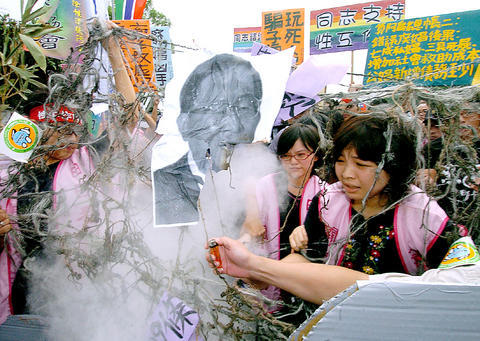On the 10th anniversary of the banning of prostitution, around 100 former sex workers and their supporters staged a demonstration in front of the Presidential Office yesterday to demand legalization of the sex industry in Taipei City.
Protesters, who included sex workers, gathered on Ketagelan Boulevard in front of the Presidential Office and burned a picture of President Chen Shui-bian (陳水扁).
The protesters were stopped by the police as they attempted to march towards the Presidential Office, and a minor scuffle occurred.

PHOTO: LIU HSIN-DE, TAIPEI TIMES
During Chen's stint as Taipei mayor, Chen abolished the prostitution licensing system on Sept. 6, 1997.
As Taipei was the only city that had an ordinance to regulate the sex industry, the abolition of the decades-old licensing system therefore put an end to legal prostitution in the country.
Although many people approved of the decision, it has created many problems.
"After prostitution was banned, many of our sisters became illegal workers, because they all have families to feed and they don't know anything else," a former licensed sex worker nicknamed Ching (
"Many of them ended up committing suicide because of the enormous economic pressure and the fear of prosecution," she said.
Of the 16 sex workers that the Collective of Sex Workers and Supporters (COSWAS) has been tracking for 10 years, three have already committed suicide due to economic pressure and long-term unemployment.
Ching said she herself is NT$3 million (US$90,000) in debt.
For those who turned to illegal prostitution, they have more to fear than the police.
"In the past [when prostitution was legal], we could pick our customers, we could call the police when we had non-paying customers," Ching said. "The regulation even stipulated that we got 70 percent of the revenue while their madams got 30 percent."
However, illegal sex workers today can no longer choose their customers, can do nothing when customers don't pay, and are often exploited by their madams, Ching said.
"They [sex workers] wouldn't hurt anyone, they're only trying to make a living. We'd like to call on the government to legalize the sex industry so they can have a safer and more secure work environment," a COSWAS secretary surnamed Chen said.

An essay competition jointly organized by a local writing society and a publisher affiliated with the Chinese Communist Party (CCP) might have contravened the Act Governing Relations Between the People of the Taiwan Area and the Mainland Area (臺灣地區與大陸地區人民關係條例), the Mainland Affairs Council (MAC) said on Thursday. “In this case, the partner organization is clearly an agency under the CCP’s Fujian Provincial Committee,” MAC Deputy Minister and spokesperson Liang Wen-chieh (梁文傑) said at a news briefing in Taipei. “It also involves bringing Taiwanese students to China with all-expenses-paid arrangements to attend award ceremonies and camps,” Liang said. Those two “characteristics” are typically sufficient

A magnitude 5.9 earthquake that struck about 33km off the coast of Hualien City was the "main shock" in a series of quakes in the area, with aftershocks expected over the next three days, the Central Weather Administration (CWA) said yesterday. Prior to the magnitude 5.9 quake shaking most of Taiwan at 6:53pm yesterday, six other earthquakes stronger than a magnitude of 4, starting with a magnitude 5.5 quake at 6:09pm, occurred in the area. CWA Seismological Center Director Wu Chien-fu (吳健富) confirmed that the quakes were all part of the same series and that the magnitude 5.5 temblor was

The brilliant blue waters, thick foliage and bucolic atmosphere on this seemingly idyllic archipelago deep in the Pacific Ocean belie the key role it now plays in a titanic geopolitical struggle. Palau is again on the front line as China, and the US and its allies prepare their forces in an intensifying contest for control over the Asia-Pacific region. The democratic nation of just 17,000 people hosts US-controlled airstrips and soon-to-be-completed radar installations that the US military describes as “critical” to monitoring vast swathes of water and airspace. It is also a key piece of the second island chain, a string of

The Central Weather Administration has issued a heat alert for southeastern Taiwan, warning of temperatures as high as 36°C today, while alerting some coastal areas of strong winds later in the day. Kaohsiung’s Neimen District (內門) and Pingtung County’s Neipu Township (內埔) are under an orange heat alert, which warns of temperatures as high as 36°C for three consecutive days, the CWA said, citing southwest winds. The heat would also extend to Tainan’s Nansi (楠西) and Yujing (玉井) districts, as well as Pingtung’s Gaoshu (高樹), Yanpu (鹽埔) and Majia (瑪家) townships, it said, forecasting highs of up to 36°C in those areas